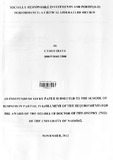| dc.description.abstract | Since its introduction in the early 1970s, socially responsible investment (SRI) has gained prominence as both a rival and a complement to conventional investment. SRI is the philosophy and practice of making strategic investment decisions by integrating financial and non-financial considerations, including personal values, societal demands, environmental concerns and corporate governance issues. One of the major concerns in socially responsible investing is whether there is a difference between the performance of socially screened portfolios and that of conventional funds.
This study is a literature review of socially responsible investment and portfolio performance. The objectives of the study are to establish the documented relationship between socially responsible investment (SRI) and portfolio performance; to investigate, from the literature, whether investor demographic characteristics moderate the relationship between socially responsible investment and portfolio performance, to examine whether the relationship between SRI and portfolio performance is intervened by portfolio management process, to identify and document research gaps in socially responsible investment and lastly to establish researchable issues in socially responsible investment. The study presents a conceptual model guided by the modern portfolio theory, the stakeholders’ theory, the institutional theory and the new social movement theory.
Literature reviewed on the performance of SRI mutual funds has been inconclusive with three schools of thought emerging: SRI under-performs, over-performs or performs as well as conventional mutual funds. The paper concludes that the conflicting results are caused by the fact that the relationship between SRI and portfolio performances is not direct but is intervened by other variables such as the portfolio management process. Five factors in the portfolio management process that are affected by SRI have been identified (Havemann and Webster, 1999). These are the portfolio diversification process, the size and structure of the investable universe, concentration and the research costs incurred in monitoring the investee companies. Another explanation into the conflicting results is that the relationship between SRI and portfolio performances may be moderated by the investors’ demographic characteristics such age, gender, level of education and amount of funds under management (Nilsson, 2008; Nilsson, 2009; Junkus and Berry, 2010).
A number of research gaps arise from the analysis of the issues examined in this paper. These include: Firstly, lack of consensus on why SRI occurs even when empirical evidence on the impact of SRI on portfolio performance is inconclusive. Secondly, difficulties in assessment of non-financial risk and return created by SRI especially given the inability to quantify social, ethical, governance, moral and environmental issues. Thirdly, most studies have not controlled for any intervening or moderating variable affecting the relationship between SRI and portfolio performance. Variables such as differences in demographic characteristics of the fund managers and portfolio management process may affect the relationship between SRI and portfolio performance.
Arising from the research gaps identified, several areas of further study have been suggested. These include: Firstly, a research instrument be developed to empirically test the variables that impact on socially responsible investment including the moderating and intervening variables. Secondly, a study can be undertaken to investigate the heterogeneity among investor clienteles and its implications for understanding the effects of social values on asset prices. Thirdly, given that investors have different reasons for investing in SRI profiled mutual funds, future research with regard to this segmentation would be to find out the reasons why investors belong to certain groups. Fourthly, further research can be done focusing on the type of mutual funds that could be marketed to the different investors’ segments and finally, an index can be developed to quantify the non-financial risk and returns existing in SRI mutual funds. | en |

